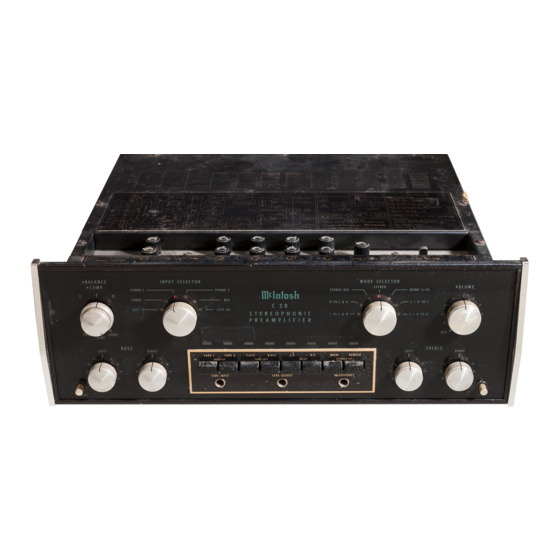
McIntosh C28 Owner's Manual
Solid state stereo preamplifier
Hide thumbs
Also See for C28:
- Manual (31 pages) ,
- Service information (30 pages) ,
- Owner's manual (24 pages)
Summary of Contents for McIntosh C28
-
Page 1: Service Contract
THE MCINTOSH C 28 SOLID STATE STEREO PREAMPLIFIER Reading Time: 37 Minutes Price $1.25... -
Page 3: Table Of Contents
Your MC 28 Stereo Preamplifier CONTENTS will give you many years of pleasant Service Contract.. 1 and satisfactory performance. If you have any questions, please contact: Installation.. 2, 3 How to Connect.. 4, 5, 6, 7 CUSTOMER SERVICE Adjusting The Top Panel Controls.. 8 Mclntosh Laboratory Inc. - Page 4 How To Connect CONNECTING A RECORD PLAYER TO PHONO 1 Connect the cable from the "left" channel of the record player into the "L" PHONO 1 input jack. Connect the cable from the "right" channel of the record player into the "R" PHONO 1 jack. PHONO 2 is provided for the use of a second record player.
-
Page 6: How To Connect
trol. The AC outlets on the SCR have a total capa- CONNECTING THE C 28 TO POWER AMPLIFIERS city of 2400 watts. Connect the MAIN output jacks to the input of a stereo power amplifier. The "L" jack is connected to AC OUTLETS the "left"... -
Page 8: Adjusting The Top Panel Controls
Adjusting The Top Panel Controls You will enjoy the best in stereo performance more sponse at low frequencies or for the room in which when the stereo system is properly balanced. For they are used. They are variable controls that provide proper balance each channel must be equal in loud- up to 6 dB of boost below 100 Hz. -
Page 9: Using The Front Panel Controls
500,000 ohms. Pres: In the left of center position the response of Tape Hd: Connects the output of any tape head (a the C28 is shaped to emphasize the upper mid- tape deck without its own electronics) to the low frequencies. - Page 10 VOLUME ON/OFF Turning VOLUME totally counter-clockwise Left: Adjusts the treble loudness from the left loud- turns the C28 OFF. The VOLUME control regulates speaker. Clockwise rotation increases the treble the loudness in both channels. The VOLUME con- loudness while counterclockwise rotation creases the treble loudness.
-
Page 11: Using The Pushbuttons
Using The Pushbuttons The C 28 is designed to be used with one, two or TAPE COPY 2->1 three tape recorders, for example—tape playback This pushbutton, when pushed IN, connects the from a tape deck (one without its own electronics) TAPE 2 OUTPUT jacks to the TAPE 1 INPUT jacks and, in addition, two complete tape recorders. -
Page 12: Balancing Your Stereo
To turn the power amplifiers off use the switch on tangle in BLUE above the pushbutton. The BLUE light the top panel of the C 28 marked POWER AMPLIFIER. indicates that the main speakers are off and no pro- This switch controls the AC to the green POWER gram can be heard from them. -
Page 13: Listening To Your Stereo
USING MICROPHONES Turn the MODE SELECTOR to MONO. Microphones in stereo may be used with the C28. Adjust the VOLUME control to the desired volume. The two MIC channels amplify microphone signals. LISTENING TO A TUNER They have a sensitivity of 2.5 millivolts and an input... -
Page 14: Performance Limits And Ratings
Performance Limits to Tape Output 40 dB to Headphone/Line Output 70 dB Tape Head at 500 Hz and Ratings to Main Output 64 dB to Tape Output 44 dB to Headphone/Line Output 74 dB Performance Limits are the maximum deviation from perfection permitted for a Mclntosh instrument. - Page 15 fier receptacles. Allows the power amplifiers to be chine 1 to tape machine 2 or vice versa. They are turned off when not needed for headphone listen- mechanically interlocked to accept only one push- ing, etc. button at the IN position at one time. LF FILTER SWITCH (Rumble Filter) MECHANICAL INFORMATION Flat or roll-off 12 dB per octave below 50 Hz, down...
-
Page 16: Performance Charts
Performance Charts... -
Page 18: Technical Description
Technical Description Basically, each channel of your C 28 consists of four main parts: low level amplifier, high level ampli- fier, active filters and headphone amplifier. Common regulated power supplies furnish power to both chan- nels. LOW LEVEL AMPLIFIER Each channel of the low level amplifier is a four transistor differential amplifier input circuit. - Page 19 POWER SUPPLY HIGH LEVEL AMPLIFIER The power supply consists of a low impedance 75 The linear high level amplifier has a gain of 20 dB. volt power supply and a 14 volt power supply for the The same careful design considerations apply with headphone amplifier.
-
Page 20: Block Diagram
Block Diagram... - Page 22 MCINTOSH LABORATORY INC. 2 CHAMBERS ST., BINGHAMTON, N. Y. 13903 607-723-3512 Design subject to change without notice. Printed in U.S.A. 038-343...
















Need help?
Do you have a question about the C28 and is the answer not in the manual?
Questions and answers